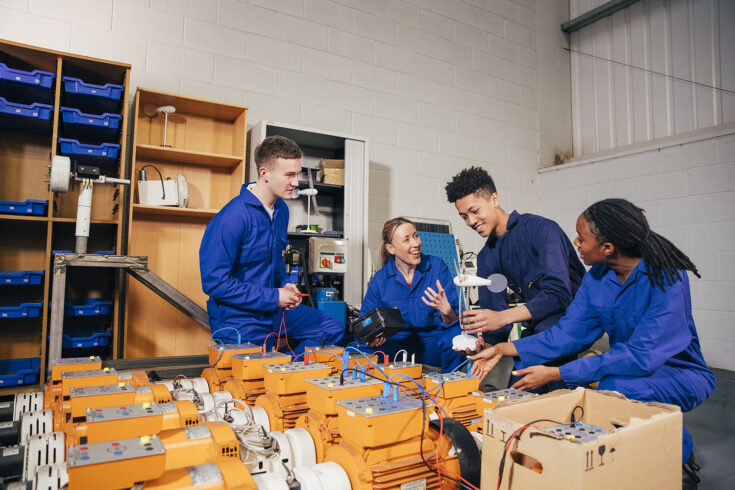PEMD technologies are found in almost everything electrical. Improvements in them will help us reach net zero, but there’s a skills shortage.
How can we ensure the workforce of today can handle the work of tomorrow?
The increase in electrification, across the board, means a substantial increase in PEMD related jobs are needed in the coming years.
For example, in the UK automotive industry there are currently around 30,000 highly skilled workers in internal combustion engine supply chains. But the shift to electric vehicles means many of these people will need to retrain to support the PEMD technologies that underpin them.
We know it’s vital these workers are equipped with the skills they’ll need to help us reach net zero and we know that too few children take engineering subjects. So what can we do to create a workforce fit for the future?
At driving the electric revolution challenge we’re investing £6 million in a variety of ways to support the UK’s PEMD industry.
How we’re supporting
Our main skills initiative is The Electric Revolution Skills (ERS) Hub. An integrated digital platform, run by Coventry University, it gives access to training, development and jobs across the nation for anyone working in PEMD, or seeking to join the industry. Find out more about the ERS Hub.
Building talent for the future
Our first skills competition, Building Talent for the Future (BTFTF) 1 saw us invest over £350,000 into 14 projects all looking at filling immediate gaps in skills, talent and training for the PEMD industry.
We wanted projects to develop courses to improve the standards of existing workforces or train new employees seeking to enter PEMD. So far, these courses have reached over 400 adults and we’re excited to see that number grow as the years progress. The success of the competition encouraged us to run a second.
Expanding opportunities
In BTFTF 2 we increased our investment, dedicating over £4 million across 16 projects. Reflecting the larger nature of the grants, these projects are creating and delivering course content and materials that support skills, talent and training across PEMD manufacturing and supply chains.
Opportunities funded include:
- apprenticeships and internships
- schools’ engagement
- technical courses and vocational training
- undergraduate, postgraduate and continuing professional development
- upskilling and reskilling of existing workforce
We have set out to support the seismic change in skills provision across the UK, which needs to be joined up and aligned. A good example of this is the creation of the Institute of Electrification and Sustainable Advanced Manufacturing (IESAM) in Newcastle.
The IESAM aims to align the north-east Institute of Technology and major education college providers across the region, to plug skills gaps across every training level.
Reaching the future workforce
We’ve backed several projects dedicated to reaching people under the age of 25. One project, called ‘ProtoEV 4 Skills’, is creating an accessible and innovative augmented reality app. Using gamification it aims to train underrepresented youth, aged 11 to 19 in Manchester and North Shields, in real world generative design and engineering.
We’ve created a science, technology, engineering, and mathematics (STEM) experiment kit called ‘Magnets in Motion’ with the Curiosity Box and the University of Bristol. Designed for upper Key Stage 2 and the move into Key Stage 3 the box explores the wonder of electromagnets and their importance in the future of our everyday life.
Explore the Magnets in Motion box.
Continuing the school outreach idea, we also supported the construction of a STEM truck by The Blair Project. Designed for teenagers who would otherwise have little exposure to STEM the project turned a secondhand van into a dedicated STEM truck. Its on-site workshops and labs, the truck brings electrification to life in a way that is relevant, fun and engaging.
Teaming up with the UK Electronic Skills Foundation led to the creation of an undergraduate award. Designed to promote interest in PEMD technologies among engineering students, it connects employers to students through one-off summer work placements.
So what’s next?
From our BTFTF1 cohort we know that 82% of projects targeted new skills development, upskilling or both. We look forward to seeing that figure increase as the BTFTF2 projects start to deliver in the coming months.
The STEM box and truck will visit more schools in 2023, raising awareness of PEMD technologies and their vital role in everything from mobile phones to solar panels and electric vehicles.
The STEM truck will reach even more young people over the summer with teams from across the country taking part.
Our work inspiring and involving everyone across the community picks up pace in 2023.
We’ll look at what future opportunities will be and consider how we can continue to support the growth of this important industry.
If you’ve got an idea, please get in touch with the team at der@iuk.ukri.org




